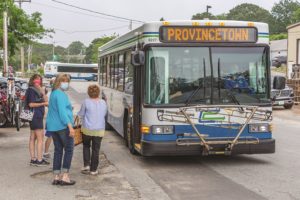The Cape Cod Regional Transit Authority has made its buses free on Fridays.
Tom Cahir, the CCRTA administrator, said fare-free Fridays would help workers and tourists as the Outer Cape recovers from the Covid-19 pandemic.
“We implemented the fare-free Friday to recognize essential workers, and people who have been cooped up in their homes for a year and are now just getting out and about,” Cahir said.

The pandemic and its economic troubles have pushed other transit authorities to make larger changes. Researchers and advocates say there’s no better time to rethink fares entirely.
“The federal pandemic aid is a once-in-a-generation opportunity to invest in bold policy measures that would otherwise be difficult to move forward,” said Phineas Baxandall of the Mass. Budget and Policy Center.
The Worcester transit authority, for example, eliminated fares shortly after the start of the pandemic, and has yet to reintroduce them, which helped preserve ridership.
“It’s been a way to encourage people to continue to use the bus, and this is going to be increasingly important as traffic becomes more of an issue,” Baxandall said. Increasing the number of transit riders could reduce traffic on congested roads like Cape Cod’s Route 6, he added.
The CCRTA’s experience bears these predictions out. Three years ago, CCRTA made fixed-route services free for riders over age 60. Since then, Cahir said, more people are taking the bus.
The Cape Cod RTA collected just under $1 million in fares in 2019, according to its 2020 Comprehensive Regional Transit plan. A little over a third came from the Flex bus and Provincetown-Truro shuttle. Those two lines, which carried over 160,000 passengers in 2019, are the only fixed routes serving the Outer Cape.
According to Cahir, the Flex bus route saw the smallest loss in riders of any line during the pandemic, and its ridership has recovered the fastest.
Fares from fixed routes are a small fraction of the total revenue counted by the RTA in its Regional Transit Plan. “Fares are 6 percent of our $24 million budget,” said Cahir. “And we haven’t increased fares in 12 years. We have never found it necessary to generate more revenue via fares.”
Then there’s the cost of fare collection, including the operation of fare boxes, and a variety of other costs associated with counting money. According to an analysis published by Baxandall, the Cape Cod RTA spends about 77 cents to collect one dollar in fares. There’s also the time spent in collecting fares.
“When somebody gets on the bus and sits down, that takes just a few seconds,” said Adam Thielker, chair of the Riders’ Action Council in Worcester. “When they’re standing there at the fare box looking for the final 15 cents, or whatever that you got to put into the machine, the bus has to sit there at the curb. You can eliminate a lot of curbside just by letting people get on the bus.”
Thielker says eliminating fares would make buses run faster. Baxandall echoed this, and noted that increasing numbers of riders might make it necessary to expand bus routes and buy more vehicles.
Alexis Walls, the assistant campaign director for the Mass. Public Health Association, emphasized that eliminating bus fares would benefit low-income people.
“The money that folks put towards transit often takes away from the funds that they could be using to cover other basic needs,” Walls said.
Thielker added that eliminating fares in Worcester has left riders with more money to spend around town. But Cahir, the CCRTA Administrator, said it was unfair to compare urban transit systems with the CCRTA, which covers fifteen towns and sees demand surge with seasonal changes in population.
“What they’re doing in Worcester, Springfield, and Brockton is a little bit different than what we do down here,” Cahir said.
Cam Blair, a reporter for the Independent, took the Flex bus on Friday, July 9 to experience fare-free Friday. With a storm raging outside, Blair noticed the bus was mostly empty, and on time, but that everyone who boarded was surprised they didn’t have to pay.



